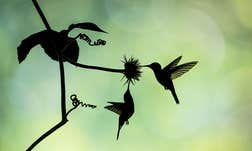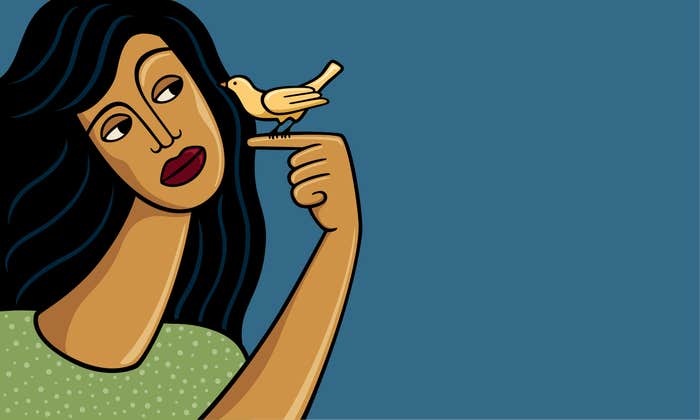
In Lewis Carroll’s Through the Looking Glass, Alice meets Humpty Dumpty, who engages her in a frustrating semantic debate. “When I use a word,” Humpty Dumpty tells her, “it means just what I choose it to mean—neither more nor less.” To which a befuddled Alice replies, “The question is…whether you can make words mean so many different things.” According to Josh Armstrong, an associate professor of philosophy at the University of California, Los Angeles, not only can you make words mean different things, doing so is a key feature of how we communicate socially.
“Oftentimes we actively construct the language that we’re speaking in the conversation that we’re engaging in,” Armstrong says. The meanings of words aren’t just dependent on situational context, but social context; a word said to a coworker might take on a completely different meaning when you say it to a close friend. Which words we choose to use with different conversational partners—and what they mean—is a central question of Armstrong’s work on the philosophy of language, and it’s a question that’s informed by research on other intelligent social animals like primates.
Armstrong—who also modeled the Nautilus Reali-Tee Shirt—recently sat down with us to answer questions about the role of philosophy in science, how language shapes our reality, and how social media has changed how we communicate.
What made you want to focus on both philosophy and science?
I didn’t develop a serious interest in science until graduate school. My love for philosophy came earlier, midway through high school. I was drawn to philosophy because it seemed like intellectual bedrock: The place where the most basic questions about reality and our place in it get to be systemically explored and debated. It wasn’t that I thought that science was irrelevant—it just wasn’t bedrock.
My views changed pretty quickly when I got to graduate school at Rutgers University. I took classes from some incredible professors and I worked in a philosophy and linguistics working group at the Cognitive Science Center. This had a transformative impact on how I approached philosophy. For one thing, it made clear to me that substantive philosophical claims—even at the bedrock!— could stand to be constrained and revised in light of work on the topic within the sciences. But more generally, it made clear to me how much deeply interesting work was happening in the sciences that could be used to generate both novel philosophical questions and novel ways of approaching familiar philosophical questions.
I don’t think science is unique in the way it can constrain or seed philosophical claims—you could say similar things about work in history, critical theory, or the arts. Philosophy done pure—that is, without any engagement with fields outside of philosophy—is not totally useless, but I do find that it tends to be misleading, myopic, and terribly boring.
What role do you think philosophy should play in science?
I think an important role that philosophy can play in the sciences is to provide a synoptic or integrative perspective—moving us toward a comprehensive picture of reality that builds on insights from a wide variety of fields and modes of inquiry. One of the things that makes science very powerful as a social practice is a division of intellectual and experimental labor. Scientists work on their specific questions using their specific research methods. They don’t always need to ask how their results conform—or fail to conform—to the results of scientists working in very different fields. Philosophers care very deeply about asking questions of exactly this kind. To paraphrase a famous line of philosopher Wilfrid Sellars, one of the aims of philosophy is to say how “things,” in the broadest sense of the term, “hang together,” in the broadest sense of the term.
Can you give us a little background on your research?
My research is on philosophical questions about communication and social interaction, particularly as they intersect with work in the cognitive and social sciences. One central question I’ve explored concerns the dynamics of language use: how we vary what we say and how we say it across contexts and choice of conversational partners. I’ve also explored how philosophical ideas about the nature of meaning and of communication can be informed by the way other intelligent animals communicate and build and maintain social relationships.
You work in a number of different fields: philosophy of biology, philosophy of language, animal cognition, and environmental philosophy. How do those all relate to one another?
I think these are just really interesting areas of philosophical inquiry in their own right. But let me mention two related connections.
The first connection goes through what might be called philosophical anthropology. Kant says that one basic question for philosophy is: What are human beings—what makes us distinctive? Like other philosophers, I want some understanding of how to answer this question. But we can’t pretend to have a serious answer to questions about what makes humans distinctive thinking creatures without serious engagement with what we now know about the commonalities we share with other intelligent animals and social organisms. This is why anthropology departments tend to have members of their departments that study biological and evolutionary questions in addition to those that study cultural and linguistic questions.
I’ve argued for the philosophical significance of comparative facts about communication and social interaction among living animals—for example, the patterns of affiliative communication and relationship repair among chacma baboons. Comparative facts like these help us theorize about the nature of communication but more specifically, why it is that language or other patterns of symbolic communication would emerge and evolve. Hence the interest in animal cognition and the philosophy of biology.
A second connection goes through a more specific thesis about mind and language which says there are linking relations connecting our psychological lives with the biological processes and events in our environment. This is often called “externalism” in philosophy. Externalists have often not been very careful about what they mean by the “external” environment. For example, it’s commonplace in the philosophy of language to say that the meanings (or “semantic contents”) of our words—for example, words like “table,” “sibling,” or “employer”—depend on how people in a community use those words. But what is a language community? Philosophers typically don’t say but there is an enormous amount of work in linguistics and the social sciences on social networks that help provide us with informative and illuminating ways of modeling language communities.
How does the language we use shape our reality?
Language shapes how we think about reality, and how we think about reality can shape our patterns of acting on reality in ways that make reality different than it would otherwise be. For example, feminists have long noted the ways in which describing women as being better at childcare than men can result in structural situations where women are expected to do more childcare than men and, as a result, do more childcare, in some cases becoming better at it. This is language shaping reality. But I think our ecological and social realities also shape the form and meanings of natural languages and the human capacity to acquire and use a natural language at all.
Richard Lewontin famously claimed that organisms and their environments can’t be understood separately from each other—ecological environments are defined by the organisms that make them up, but organisms modify and even transform the very environments. This is called “niche construction” in biology and it’s now recognized as a pervasive force in the living world.
I make a similar claim about the relation between language and reality in humans. Language is reality-dependent in that the meanings of our linguistic actions are constituted by the objects, properties, and relations that the world provides. But one of the ways we’re distinctive as animals is the extent to which we rely on others to get practical knowledge for coping with our environments in ways that allow us to modify those environments. These culturally acquired capacities for niche construction are central to the story of the biological evolution of our species. Humans are a species of cultural niche constructors through and through, for good and also for ill.
What’s the difference between linguistic reality and psychological reality?
Language differs from other systems of mental representation (such as perception and emotion, cognitive attention, imagination, etc.) in how socially dependent it is. However, this social dependence is a difference of degree rather than a difference in kind. In my opinion all systems of mental representation—including perception, attention, and imagination—are socially dependent in important respects. Conversely, there are respects in which the capacity to acquire and use language is innate in humans in the sense that core aspects of the capacity are stable across specific changes in the developmental contexts in which humans find themselves.
Still, I do think there are differences between language and other systems of psychological representation and social coordination. Human languages have a specific format. At the level of phonology and syntax, languages are made up of atomic word-like lexical elements and a set of compositional procedures that allow for an indefinite number of meaningful complex phrases and sentences. At the semantic level, languages enable the representation of an open-ended set of subject matters. Through a contingent (or “arbitrary”) pairing of forms of meanings, we can use language to think and communicate about food, about locations in space, about social relations and systems of exploitation, and about our own and others’ representational states of mind.
Other systems of mental representation don’t generally display these features together. It’s what makes language a very powerful engine—a system of infinite possibilities of meaningful expression realized through finite means.
A lot of your work involves living systems and changing contexts where the “reality” at any given time is sort of dynamic. Are there any fixed points in these shifting realities?
I don’t think we should view change as being the contrary of stability. Living systems—living organisms in particular—remain the same precisely by changing in regular ways.
Most obviously, patterns of social interaction are constrained by physical laws and developmental constraints on efficient computation. But social interactions are also constrained by prior history which make some patterns of coordination more salient or psychologically natural than others. These are fixed points—to some varying degrees—in social interaction but they are not absolutely immune to change.
The methods we use to communicate have dramatically changed over the past 30 years, with the rise of email, text messaging, social media, and so on. How has that changed the way we communicate?
I suspect these technological changes vary in their influence on the way we communicate. Of course, emails and text messages are different from written letters, but there’s much more of a continuum in terms of changes in communication.
Social media seems to be quite different. A central generalization about human communication—and indeed, about the communication practices of other animals—is that it is partner-specific. How we communicate is sensitive to who we are communicating with and our estimation of our partner’s characteristics: their social identities, their concerns, the questions they want to answer, etc. This allows us to design our messages to fit our audiences, but also allows us to hold others accountable for patterns of communication that fail to conform to our community norms. The partner-specificity of communication also allows us to build and maintain social bonds with others while we’re engaging in conversation. Standard forms of social media lack these features in many important respects.
People on social media are often not communicating to specific audience members and are operating anonymously. It’s probably no surprise that we see so much vitriol on social media and so many people communicating in ways that traffic in bullshit. Because there’s very little fear of any reputational effects in their social communities from what or how they communicate on social media, people feel free to communicate in ways that are indifferent to the truth of what they say. It seems to me to be an open question of whether regulations on social media could help address this problem without destroying the things that make social media valuable.
Words by Jake Currie.
Lead photo by Elisa Ivers.


























